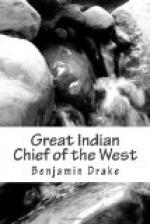Black Hawk and his band have always been opposed to Keokuk, and since the late war, which proved so disastrous to them, and into which they were plunged, in opposition to his counsel, they have looked upon him with increased aversion.
They have made repeated efforts to destroy his influence with the remainder of the tribe, and owing to the monotony of his pacific rule, were, on one occasion, nearly successful. A spirit of discontent pervaded his people—they complained of the extent of the power which he wielded—they needed excitement, and as his measures were all of a peaceful character, they sought it in a change of rulers. The matter was at length openly and formally discussed. The voice of the nation was taken, Keokuk was removed from his post of head man and a young chief placed in his stead. He made not the smallest opposition to this measure of his people, but calmly awaited the result. When his young successor was chosen, Keokuk was the first to salute him with the title of Father. But the matter did not rest here. With great courtesy, he begged to accompany the new chief to the agent of the United States, then at Rock island; and with profound respect, introduced him as his chief and his father—urged the agent to receive him as such, and solicited, as a personal favor, that the same regard that had ever been paid to him, by the whites, might be transferred to his worthy successor. The sequel may be readily inferred. The nation could not remain blind to the error they had committed. Keokuk as a private individual was still the first man among his people. His ready and noble acquiescence in their wishes, won both their sympathy and admiration. He rose rapidly but silently to his former elevated station, while the young chief sunk as rapidly to his former obscurity.




